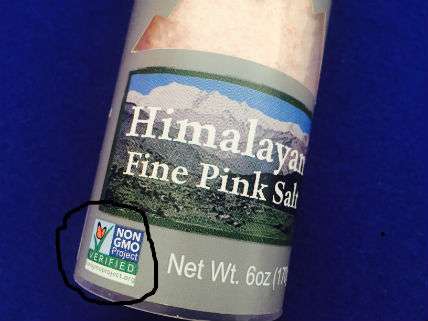Mandatory GMO Food Labels Address Largely Supernatural Concerns and Are Meant to Confuse You
Activists hope that consumers will misinterpret GMO ingredient taglines as "warning" labels

"We're kosher and have to answer to an even higher authority," was the tagline in Hebrew National's amusing TV advertisement suggesting that God's production requirements for its hotdogs exceed those mandated by U.S. government regulators. The company follows kosher process standards and labels its meats to provide that information to consumers who adhere to the Torah's religious strictures on foods.
Hebrew National was also clearly implying to non-religious consumers that its Deity-approved wieners are somehow better (and safer) than conventionally produced hotdogs. However, at least one study reported that kosher chicken had the nearly double the frequency of antibiotic-resistant E. coli than conventionally produced chicken did.
One of the invidious tactics used by anti-biotech activists is to argue for government mandates to label foods using ingredients made from modern biotech crops. They hope that consumers will misinterpret them as "warning" labels. But as the Food and Drug Administration has pointed out numerous times:
The agency is not aware of any valid scientific information showing that foods derived from genetically engineered plants, as a class of foods, differ from other foods in any meaningful way. GE (genetically engineered) foods don't present greater safety concerns than foods developed by traditional plant breeding.
So GMO labels, like kosher labels, would be essentially process labels since there is no nutritional or safety differences between biotech and conventional foods. Would GMO or non-GMO labels actually inform consumers or would it confuse them? Last November, a report on the process labeling of food issued by the Council on Agricultural Science and Technology (CAST) addressed question. The study noted the proliferation of food process labels including those for Certified Organic, Rainforest Alliance Certified, rbST free, Fair Trade, and Free of Genetically Modified Organisms.
These labels, like kosher labels, aim to address the supernatural* concerns of some consumers. But, as the CAST study observed…
…process labeling often has serious unintentional consequences. For instance, labeling the benefits of a process for new niche product can implicitly cast the conventionally produced product in a negative light. This type of stigmatization of the conventional product can be particularly problematic in situations in which no scientific evidence exists that the food produced with the conventional process causes harm, or even that it is compositionally any different.
Of course, anti-biotech activist groups like Just Label It that are demanding government-mandated GMO labels actually intend to mislead consumers into thinking that biotech foods are somehow less safe or nutritionally different than other foods.
Instead of mandatory labels, CAST recommends voluntary process labels:
[W]e recommend that mandatory labeling occur only in situations in which the product has been scientifically demonstrated to harm human health. Likewise, governments should not impose bans on process labels because this approach goes against the general desire of consumers to know about and have control over the food they are eating and it can undermine consumer trust of the agricultural sector. We believe that a prudent approach is to encourage voluntary process labeling under the conditions that these labels are true and scientifically verifiable and that, when the labels claim a product "contains" or is "free of" a certain production-related process, the product should also include a label stating the current scientific consensus regarding the importance of this attribute.
In an effort to be helpful, how about a voluntary label that reads something like: "Non-GMO Verified: Totally Useless Information." Simple and accurate.
It should, however, be noted that Campbell's Soups earlier this month called for mandatory GMO labeling. The company flatly states that foods made using ingredients from biotech crops are as safe and as nutritious as foods produced using other processes. I suspect that the company believes that GMO labels pasted on everything would for most consumers go in one eye and out the other with no effect on their purchasing decisions.
For your delectation, the Hebrew National commercial is below:
*supernatural: (Of a manifestation or event) attributed to some force beyond scientific understanding or the laws of nature.


Show Comments (77)